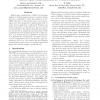Free Online Productivity Tools
i2Speak
i2Symbol
i2OCR
iTex2Img
iWeb2Print
iWeb2Shot
i2Type
iPdf2Split
iPdf2Merge
i2Bopomofo
i2Arabic
i2Style
i2Image
i2PDF
iLatex2Rtf
Sci2ools
107
click to vote
ACSAC
2006
IEEE
2006
IEEE
Address-Space Randomization for Windows Systems
Address-space randomization (ASR) is a promising solution to defend against memory corruption attacks that have contributed to about three-quarters of USCERT advisories in the past few years. Several techniques have been proposed for implementing ASR on Linux, but its application to Microsoft Windows, the largest monoculture on the Internet, has not received as much attention. We address this problem in this paper and describe a solution that provides about 15-bits of randomness in the locations of all (code or data) objects. Our randomization is applicable to all processes on a Windows box, including all core system services, as well as applications such as web browsers, office applications, and so on. Our solution has been deployed continuously for about a year on a desktop system used daily, and is robust enough for production use.
Related Content
| Added | 10 Jun 2010 |
| Updated | 10 Jun 2010 |
| Type | Conference |
| Year | 2006 |
| Where | ACSAC |
| Authors | Lixin Li, James E. Just, R. Sekar |
Comments (0)

